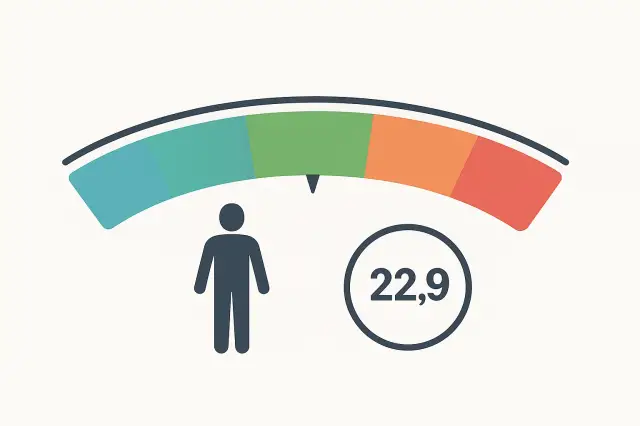What is the BMI Calculator
The BMI Calculator on Calculatorr.com helps you quickly determine your Body Mass Index (BMI) — a simple yet powerful indicator used to estimate whether your weight is within a healthy range for your height.
BMI is one of the most recognized measures in health and fitness. It provides a numerical value that reflects your body composition based on your weight and height, helping you identify if you are underweight, at a healthy weight, overweight, or obese.
The calculator is designed for both men and women and works for adults of all ages, providing instant results and a clear explanation of your BMI category.
Why BMI Matters for Your Health
Understanding your Body Mass Index is the first step toward managing your health effectively. A balanced BMI reduces the risk of several chronic diseases such as:
-
Type 2 diabetes
-
High blood pressure
-
Cardiovascular diseases
-
Certain types of cancer
Maintaining a healthy BMI also helps improve energy levels, sleep quality, and overall well-being.
Even though BMI doesn’t measure body fat directly, it serves as a useful screening tool for assessing potential health risks related to weight.
How to Use the BMI Calculator
Using the BMI Calculator on Calculatorr.com is fast, simple, and accurate. Here’s how:
-
Enter your weight — You can choose between kilograms (kg) or pounds (lbs).
-
Enter your height — Choose between centimeters (cm) or feet and inches.
-
Click “Calculate BMI.”
-
The tool instantly displays your BMI score along with a weight category, such as:
-
Underweight
-
Normal weight
-
Overweight
-
Obesity (Class I, II, or III)
-
You’ll also receive helpful information about what your BMI means and how to improve it if needed.
Example of BMI Calculation
Let’s look at a practical example:
If you weigh 70 kg and your height is 1.75 m, the BMI formula is:
BMI = weight (kg) / [height (m)]²
So,
BMI = 70 / (1.75 × 1.75) = 22.86
A BMI of 22.9 falls into the “normal weight” category, meaning your weight is healthy for your height.
BMI Categories and Their Meaning
| BMI Range | Category | Health Risk |
|---|---|---|
| Below 18.5 | Underweight | Possible nutritional deficiency |
| 18.5 – 24.9 | Normal weight | Low health risk |
| 25 – 29.9 | Overweight | Moderate risk |
| 30 – 34.9 | Obesity Class I | High risk |
| 35 – 39.9 | Obesity Class II | Very high risk |
| 40 and above | Obesity Class III | Extremely high risk |
These ranges apply to adults, but the calculator also includes useful links to tools for other age groups, such as the Baby Percentile Calculator or the Pregnancy Calculator.
Key Benefits of the BMI Calculator
-
Instant results: Get your BMI in seconds.
-
Customizable units: Works with both metric and imperial systems.
-
Accurate ranges: Based on World Health Organization (WHO) standards.
-
Completely free: No registration or subscription required.
You can also use it as a starting point before trying related tools like the Calorie Calculator or Body Fat Calculator to get a more detailed health overview.
Real-Life Use Cases
The BMI Calculator is not only for individuals but also for professionals and organizations:
-
Fitness trainers use it to assess clients before designing workout plans.
-
Nutritionists use it to tailor diet programs.
-
Health-conscious individuals use it for tracking progress over time.
-
Employers or insurance companies may use BMI data for wellness programs.
No matter your goal — losing weight, gaining muscle, or maintaining balance — this calculator gives you a reliable baseline for improvement.
How to Interpret Your BMI Correctly
While BMI is a great starting point, it should not be the only measure of health. People with high muscle mass, such as athletes, might have a higher BMI even if they have low body fat.
To get a complete picture, combine your BMI results with:
-
Body Fat Calculator — estimates your fat percentage.
-
Macronutrient Calculator — helps plan your diet based on protein, carbs, and fats.
-
Calorie Calculator — calculates how many calories you need per day.
These tools complement each other perfectly, creating a holistic view of your health.
Tips for Maintaining a Healthy BMI
Here are some simple yet effective strategies to reach or maintain a healthy BMI:
-
Follow a balanced diet rich in fruits, vegetables, lean proteins, and whole grains.
-
Stay active — aim for at least 150 minutes of moderate exercise per week.
-
Sleep well — 7–8 hours of quality sleep supports weight management.
-
Stay hydrated throughout the day.
-
Avoid extreme diets — focus on sustainable lifestyle habits instead.
Regularly checking your BMI helps you stay accountable and motivated on your health journey.
How Often Should You Check Your BMI
Experts recommend calculating your BMI every 4–6 weeks when actively working on fitness goals, or every few months to monitor general health. The BMI Calculator on Calculatorr.com makes it easy to do this anytime, anywhere.
Common Myths About BMI
-
Myth: A normal BMI means perfect health.
Fact: BMI doesn’t measure muscle, fat distribution, or lifestyle factors. -
Myth: BMI doesn’t apply to anyone with athletic builds.
Fact: It’s still a useful reference — just interpret it alongside body fat percentage. -
Myth: BMI is outdated.
Fact: It remains one of the most practical, accessible, and scientifically supported indicators worldwide.
Why Choose Calculatorr’s BMI Tool
Unlike generic calculators, the BMI Calculator on Calculatorr.com stands out for:
-
Clean interface: Simple to use on any device.
-
Accurate conversions: Supports metric and imperial units seamlessly.
-
Instant interpretation: No need to look up BMI charts.
-
Integrated tools: Linked with calorie, fat, and nutrition calculators for deeper analysis.




